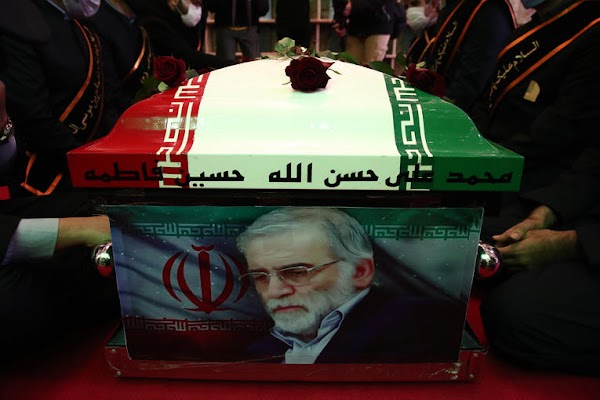How the Israeli's were able to operate in the heart of Iranian territory | Flash News
How the Israeli's were able to operate in the heart of Iranian territory
The murder of Mohsen Fakhrizadeh, the father of Iran's nuclear program, attributed to Israeli intelligence services, remains an enigma. The physicist's widow saw a dozen assailants. Are they Israelis or are they local recruits? For Tehran, this is a new blow.
All indications are that Israel was behind the assassination of the iranian nuclearfather, Mohsen Fakhrizadeh, who was killed on 27 November in an attack east of the Iranian capital.
Media around the world have since been looking at the motives for the operation, which is seen as a message sent to Tehran just weeks before a transfer of power expected in Washington.
But this immediate reading does not explain the modalities of a sophisticated and delicate operation, which always involves many unknowns.
How did the Israeli intelligence services manage to eliminate a prominent figure in The Iranian territory, despite the enhanced security arrangements?
A long-planned operation
"Caution remains in the face of the various hypotheses that are circulating," warns Thomas Juneau, a professor at the University of Ottawa and an expert on Iran.
However, a number of known data indicate that this is a long-planned large-scale operation that has benefited from almost unlimited resources, support from the US ally, state-of-the-art technology and an investment in intelligence that is in the face of the threat posed by Iran in the eyes of the Israeli authorities.
These investments have led, over the years, to a "strong penetration of Israeli networks in Iran", according to Thomas Juneau.
Mobilize the time factor
"The development of human and technological capabilities is supported by large contingents in Israel to verify information received from Iran," said Nick Grinstead, a security expert at Beck International, a Bahrain-based consultancy.
Beyond these resources, Tel Aviv was able to mobilize the time factor to its advantage in order to minimize the risks of the operation.
"Unless there's a lucky one, it can take several years to prepare for this kind of operation," says Bruce Riedel, an American security expert at the Brookings Institution [a think tank].
Over time, the surveillance mechanisms, operated by men or cameras, can confirm the target's schedule.
"Officers had to wait to find out the route Fakhrizadeh was about to take on the day of the attack, which took place on a road outside the city," Grinstead said.
A remote-controlled weapon
The information gathered is used to develop an assassination strategy or an "action plan," Riedel says.
Other elements remain more obscure. The day after the killing, Iranian sources referred to a remote-controlled weapon, which would not have required any human presence on the ground.
This assumption has not been denied by the Israeli authorities, who have used this type of weapon in the past.
But many doubts remain, not least because of statements from witnesses at the scene of the crime on Friday [27 November]. Among them were Mohsen Fakhrizadeh's wife and son, who reported a dozen assailants shooting at the scientist's bodyguards.
Human participation essential to attack
"It is still too early to reach firm conclusions about the precise method that has been used," concludes Thomas Juneau.
But regardless of the weapon used, the participation of men was essential to the preparation of the attack.
"Even if the option of a remotely controlled weapon proved to be accurate, Israeli agents would still have needed to infiltrate this high-tech weapon on Iranian territory," Grinstead said.
It remains to determine the identity of those involved. "Local recruits or infiltrated Israelis," Riedel says.
Iranian Jews in Israel
Iranians might be willing to help Israel on the ground, for political or financial reasons, certainly by taking the risk of paying a high price.
Sending Israelis to Iran is also plausible. "The participation of men was essential to the preparation of the attack, Iranian Jews from Israel who could easily blend into the country, entering the territory from Baku, Dubai or other cities where large Iranian communities reside," explains Bruce Riedel.
"It may also be a mixed team, but it's still speculation at this point," Grinstead said.
Confirmation of israeli infiltration would mean that Tel Aviv would have waited for the exfiltration of the agents before triggering the final stage of the action plan, so as not to endanger them.
A setback for Tehran
But beyond the details of the case, the death of the scientist represents a definite setback for the Iranian authorities who find themselves embarrassed by the flaws of the security apparatus and the contradictory statements emanating from the various parties.
Especially since the assassination comes at the end of a particularly painful year for Tehran.
A year that began last January with a U.S. strike against General Qassem Soleimani, head of the Al-Quds Force in the Islamic Revolutionary Guards, and continued with an attack on the Natanz nuclear site and the assassination ofal-Qaeda leader Abu Mohammad Al-Masri in Tehran last August.
A repeated check that brings a certain discredit on the security apparatus, yet composed of several agencies deemed competent.
"The Revolutionary Guard or the Ministry of Intelligence are two very capable organizations that have distinguished themselves in Syria, Lebanon, Yemen and elsewhere," says Bruce Riedel.
The killing made it all the more difficult because specific measures had been put in place to ensure the safety of Mohsen Fakhrizadeh, who the authorities knew could be the target of an attack.
"His identity was so protected that until 2018 it was impossible to find a picture of him. He was monitored 24 hours a day," Grinstead said.
Beyond possible operational flaws, "this is therefore a failure at the symbolic and political level: it is particularly embarrassing for the Islamic Republic, which devotes so many resources to internal security", concludes Thomas Juneau.


What do you mean by Tel Aviv, you use several times, you mean the capital, Jerusalem?
ReplyDeleteInternationally recognized Capital Tel Aviv.
Delete